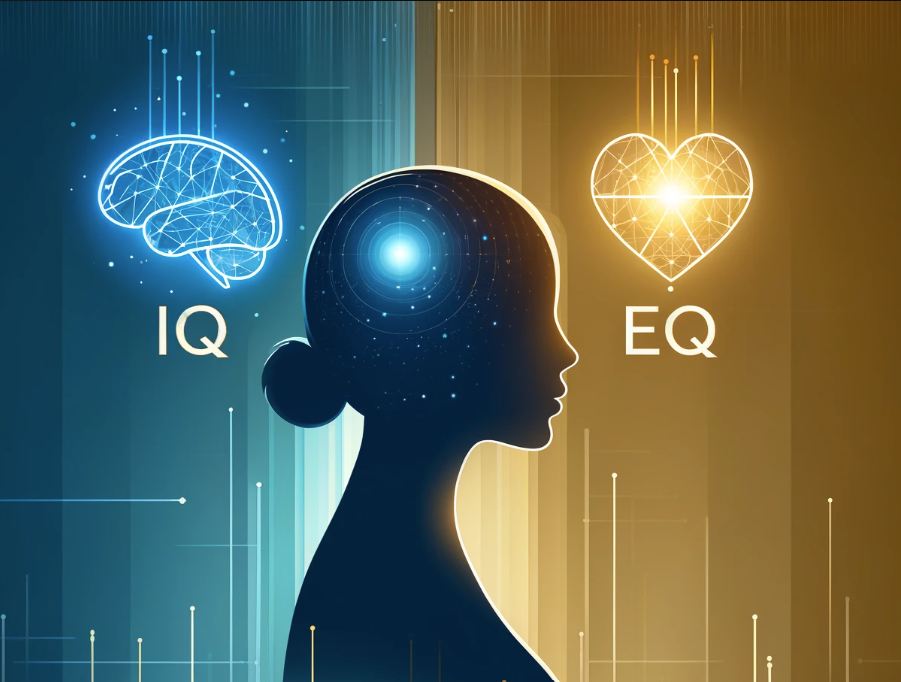
Picture this: You’re a CFO, sitting at your desk, staring at a shiny new AI system promising to revolutionize your financial close process. Faster month-end closings? Automated reconciliations? Real-time reporting? It sounds like a dream—until the doubts kick in. What if it misses critical adjustments? What if the team resists the change? What if I’m not ready to lead this transformation? As a Finance & Accounting Transformation SME specializing in Record to Report (R2R) and Financial Close, those jitters feel all too familiar. In today’s world of Generative AI (GenAI) and Agentic AI, that mix of excitement and uncertainty is a common challenge.
That’s where Emotional Intelligence (EQ) steps in as a game-changer, often outshining the trusty Intelligence Quotient (IQ). Recently revisiting Daniel Goleman’s Emotional Intelligence: Why It Can Matter More Than IQ (1995) brought a fresh perspective, and the book’s framework—self-awareness, self-regulation, motivation, empathy, and social skills—feels like a lifeline in this AI-driven age. Let’s explore why EQ might be the key to navigating these uncertainties, using a hypothetical scenario from the financial close world to bring it to life.
IQ Opens Doors, But EQ Keeps the Party Going
IQ is that brainy side of us that crunches numbers, deciphers AI algorithms, and keeps the books in check during a close. Yet, Goleman hits the nail on the head with, “IQ offers little to explain the different destinies of people with roughly equal promise, schooling, and opportunity.” Having seen brilliant minds with high IQs struggle when the human side of change emerges—especially with AI in the mix—this rings true.
EQ, though, brings the heart into play. It’s about understanding personal emotions and tuning into those of the team. Goleman’s five pillars are the glue that holds everything together when AI throws a curveball. Let’s see how this works.
A Hypothetical Journey: Leading a Financial Close Transformation
Imagine a CFO at a mid-sized firm, ready to roll out an Agentic AI system to streamline their Record to Report process, focusing on the financial close. With a sharp IQ, they map out workflows, double-check data accuracy, and predict time savings. But then the what-ifs hit: Will the AI botch intercompany reconciliations? Will it throw off the team’s groove during the close crunch? Having felt that uncertainty myself with new tools, it’s a relatable challenge.
Here’s where EQ steps up. Goleman describes self-awareness as “having a deep understanding of one’s emotions, strengths, weaknesses, needs, and drives.” In this scenario, the CFO pauses, senses that twinge of doubt, and decides to test the AI on a smaller close cycle with the vendor. By blending their “intellectual abilities” (IQ) with a dose of emotional honesty (EQ), they lead with confidence instead of fear. It’s a small move that sets a calm vibe for the team, showing that even leaders can grow alongside technology.
Keeping Cool When Things Heat Up: Self-Regulation Saves the Day
Now, picture this: The AI flags incorrect accruals due to a data mapping glitch, and the close deadline looms. IQ helps the CFO spot the error, but without EQ, they might lose their cool—something Goleman calls “emotional hijacking,” where emotions derail rational thinking. Having witnessed that frustration firsthand, it’s not a pretty sight! Instead, the CFO leans on self-regulation. Goleman writes, “People who are in control of their feelings and impulses… are able to create an environment of trust and fairness.” They team up with the accounting crew to fix it, reassuring everyone that their expertise still shines, even with AI in the mix. That steady hand turns a hiccup into a trust-building moment.
Empathy: The Heartbeat of Team Connection
As the AI rollout continues, the CFO notices the team’s unease—quiet meetings, worried whispers about job security during the close rush. Having felt that tension myself, it’s a challenge worth addressing. That’s where empathy shines. Goleman calls it “the ability to know how another feels… a fundamental people skill.” The CFO chats one-on-one, listens to their fears, and explains how AI will handle the grunt work of journal entries, freeing them for big-picture analysis like variance reporting. It’s that human touch—validating their worries—that turns resistance into teamwork. No AI can replicate that!
Motivation: Lighting a Fire Under the Vision
Pushback starts creeping in, but the CFO doesn’t back down. They tap into what Goleman calls “a passion for the work itself,” a key part of motivation. He says, “People with a high degree of motivation remain optimistic even when the score is against them.” The CFO rallies the team with a shared dream: a faster, sharper financial close that gives them time for strategic wins. It’s not just about numbers—it’s about inspiring each other. That spark turns uncertainty into a chance to grow, with AI as a helpful ally in the R2R process.
Social Skills: Chatting Our Way to Success
Finally, the CFO uses social skills to keep things open. Goleman defines it as “friendliness with a purpose: moving people in the direction you desire.” They host workshops and casual chats, breaking down AI’s benefits—like real-time close visibility—while easing job security fears. Having found those conversations build a real sense of unity, they ensure the transformation clicks into place here too.
EQ + IQ: The Perfect Leadership Duo
IQ provides the smarts to tackle AI, but EQ brings the heart to lead through the messy, human parts of change. Goleman’s wisdom shows it’s self-awareness, empathy, and motivation that turn challenges into triumphs. In this GenAI and Agentic AI era, blending both is key—especially in high-stakes areas like Record to Report and Financial Close. So, how do you weave EQ into your leadership style? Sharing thoughts in the comments would be appreciated.
#Leadership #EmotionalIntelligence #CFO #FinanceTransformation #RecordToReport #FinancialClose #AI #GenAI #AgenticAI